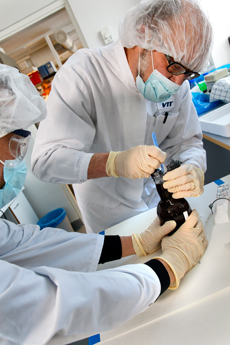VTT to study one of world’s oldest beers
- Like
- Digg
- Del
- Tumblr
- VKontakte
- Buffer
- Love This
- Odnoklassniki
- Meneame
- Blogger
- Amazon
- Yahoo Mail
- Gmail
- AOL
- Newsvine
- HackerNews
- Evernote
- MySpace
- Mail.ru
- Viadeo
- Line
- Comments
- Yummly
- SMS
- Viber
- Telegram
- Subscribe
- Skype
- Facebook Messenger
- Kakao
- LiveJournal
- Yammer
- Edgar
- Fintel
- Mix
- Instapaper
- Copy Link
Posted: 8 February 2011 | VTT | No comments yet
Åland archipelago, divers retrieved well-preserved bottles of champagne and five bottles of beer from the wreck of a ship that likely sank during the first half of 1800s…
Åland archipelago, divers retrieved well-preserved bottles of champagne and five bottles of beer from the wreck of a ship that likely sank during the first half of 1800s...
In the summer of 2010 in the Åland archipelago, divers retrieved well-preserved bottles of champagne and five bottles of beer from the wreck of a ship that likely sank during the first half of 1800s.


The Provincial Government of Åland has delivered one of the retrieved bottles of beer to VTT, where its analysis as just begun. VTT will study what microbes – for example, yeast or lactic acid bacteria – remain in the beer. DNA analyses also allow the study of dead cells. Additionally, VTT will use chemical analyses to determine what kind of raw materials were used in the brewing of the beer.
“It is very interesting to find out what kind of yeast was used in beer brewing in the early 1800s, and what the beer’s quality was like. Was it perhaps very strong and bitter? The role of yeast in beer brewing was not yet fully understood in the early 1800s”, says Annika Wilhelmson, Customer Manager at VTT.
”What we want to do first of all is to analyse the contents of the bottles. After that, we hope to be able to recreate the original recipe so that it can be used to make beer”, says Rainer Juslin, Department Head at the Provincial Government of Åland.
VTT has decades of experience in malt and brewery research. VTT’s expertise in, for example, proteomics and DNA will be utilised in the project.
The research results will be ready in May 2011. VTT will prepare a scientific article of the results in due course.




